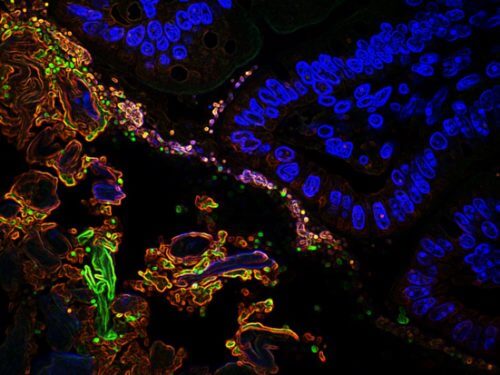"It is important to understand that these bacteria play very important roles in our health and therefore we must learn to live in peace with them. The intestinal bacteria, which are the main and densest population in our microbiome, maintain complex relationships with our bodies - relationships that developed during a long course of co-evolution," says Dr. Naama Geva-Zatorski, who studies the population of intestinal bacteria.

The population of bacteria that exists in our body plays a critical role in our health. This population, called the microbiome, affects us already at birth, and the microbiome of babies who passed through the birth canal is different from that of babies born by caesarean section.
The microbiome has different and surprising roles in the living world. Elephants, for example, eat their own feces because it provides them with a wealth of bacteria that they cannot find anywhere else. The squid camouflages itself using bacteria that produce light on its body and thus hides its shadow from its predators. The microbiome also deeply affects us, humans, as it is involved both in maintaining our health and in many diseases including diabetes, cancer and obesity. It even affects the mood.
The effect of the microbiome on the immune system is the focus of research by Dr. Naama Geva Zatorsky, a new faculty member at the Technion Rappaport Faculty of Medicine and the Technion Integrated Cancer Research Center (TICC).
Dr. Geva-Zatorski, 39, was born in Moshav Ometz in Emek Hefer and grew up in "many places in the world." Even as a child, even before she knew what the word "biology" meant, she loved to collect leaves and observe snails and other animals. When she started studying biology, she discovered that even bacteria communicate with each other and with the environment, and this communication later became the focus of her scientific research.
"We all know that there are a lot of bacteria in our bodies," says Dr. Geva Zatorski, "but it is important to understand that these bacteria play very important roles in our health and therefore we must learn to live in peace with them." The intestinal bacteria, which are the main and densest population in our microbiome, maintain complex relationships with our body - relationships that developed during a long course of co-evolution."
Lecture by Dr. Geva Zatorsky on the subject of the microbiome:
Her academic career began with a bachelor's degree at Tel Aviv University and a master's and third degree at the Weizmann Institute. In her advanced degrees, she dealt with the reactions of cancer cells to drugs and the development of more effective anti-cancer drug combinations, and later entered the field of current research - the effect of the microbiome in the digestive system on the cells of the immune system. Along the way, she won many awards, including the UNESCO-L'Oréal Award "For Women in Science" for 2012. Until joining the Technion, she worked in the Department of Microbiology and Immunobiology at the Harvard Medical School. She recently won the Alon Scholarship - a prestigious scholarship designed to facilitate the admission of young researchers to universities in Israel - and was selected as a "Horev Fellow" as part of the Technion's program for leading leaders in science and technology.
In her research, which was published in CELL, Science and other leading journals, Dr. Geva-Zatorsky showed that the connections between the microbiome and the immune system dramatically affect the functioning of this system. "During my stay in the United States, I developed a new technology that allows us to monitor the microbiome in the living organism in real time. This technology shows us 'live' the communication between the bacteria and themselves and between them and our body."
With the method she developed, Dr. Geva-Zatorski observes bacteria and the cells of the immune system and studies the connections between them. In experiments with a mouse model, she showed the importance of intestinal bacteria in the development of the immune system. According to her, "When we add appropriate bacteria to the organism, its immune system develops and strengthens. This is of course reminiscent of the development of the baby's immune system in response to the presence of bacteria. Our technology allows us to identify the role of each bacterium in this process, and the idea is that in the future we will produce from these bacteria specific medicines for various disruptions in the immune system as well as for various diseases."
